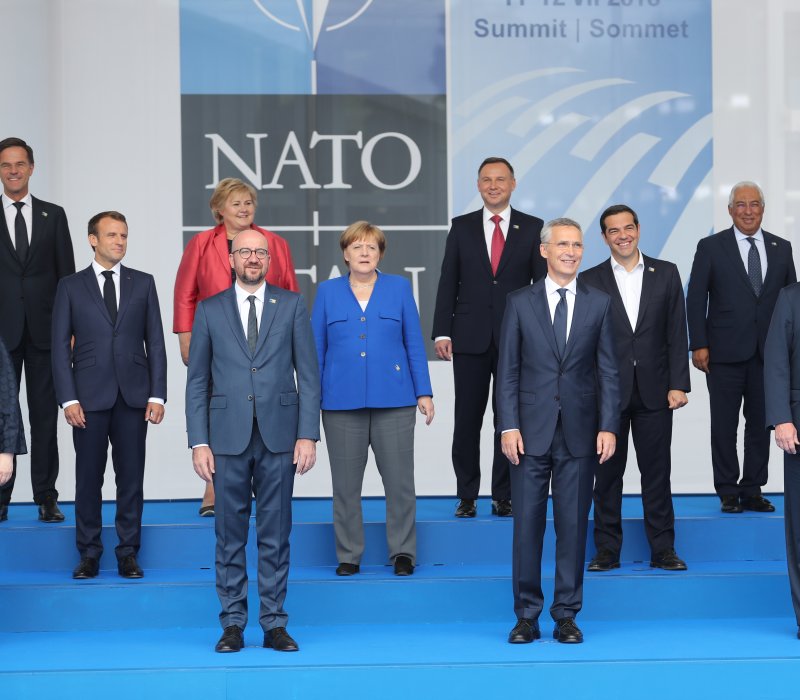Heads of state and government pose for a photo during a NATO summit in Brussels, Belgium, on Wednesday. Photo by Oliver Hoslet/EPA-EFE
In terms of style, NATO will argue that the near crash-landing caused by President Donald Trump's bellicose bluster and demands at the summit was averted.
The alliance agreed to a 23-page declaration with 79 action items, including commitments to spend more on defense and at some stage admit Georgia and Ukraine. In terms of substance, the summit is likely to prove a disaster. Of course, Trump's meeting Monday with Russian President Vladimir Putin will have no small effect on NATO's future.
Throughout its nearly 70 years of life, NATO has endured many crises that threatened to split the alliance over the most serious policy issues. Admittance of West Germany; the 1956 Suez crisis and Soviet repression in Hungary and Poland; France's withdrawal from the military structure in 1966; Prague Spring in 1968; later the Euro-missile crises of the early 1980s; and finally the second Iraq War of 2003 all threatened alliance cohesion. The difference was that up until the Berlin Wall fell, the threat of the Soviet Union contained these centrifugal forces.
Today, there is no threat, not even what Russia has done in occupying parts of Georgia and annexing Crimea, equivalent to the Soviet Union. While Trump ordered NATO to increase annual defense spending to 4 percent of GDP -- a figure that not even the United States can afford -- the alliance already outspends Russia by about 15 to 1. But what really destroyed cohesion was the failure of any of the alliance members to stand up to Trump's bullying, preferring to offer polite rebuttals instead.
Imagine if Lord Carrington, who died last week at 99, or Lord George Robertson or Manfred Werner had returned as NATO secretary general. Each would not have stood idly by as the president directly attacked the alliance and individual members. This performance has not been missed by Moscow.
The basis of the NATO alliance is Article 5 that states "an attack against one is an attack against all." If the Soviet Union dared to invade westward, the alliance would gone to war invoking Article 5. Interestingly, the only time Article 5 has ever been used was on Sept. 12, 2001. Invoked under then-Secretary General George Robertson, the George W. Bush administration was not in favor, fearing that the allies' lack of military capability would retard American responses.
Given that the other 28 NATO leaders were virtually cowed by Trump's swagger, from Putin's perspective, what would the alliance do if Russia decided to send a few "little green men" into the Baltics, Northern Norway or Romania. Or suppose Russia chose to occupy Little Diomede, a small American island in the northern Alaskan archipelago only several miles from Russia? Would Article 5 be requested, especially if Russia threatened NATO that it was prepared to use nuclear weapons in the event of war?
Of course, Putin has no intention of violating NATO's borders with military force. Propaganda, misinformation, cyber, interference in domestic elections and politics and intimidation through economic or military means are all fair game. And I noted last week, as a military alliance, NATO relies on military and not political tools to respond. How will Putin react after observing NATO passivity to Trump's tantrums?
Angela Merkel had an opportunity. The president called Germany a "captive" of Russia, depending on its energy for about 60 to 70 percent of its needs. Further proof was former German Chancellor Gerhard Schroeder's chairmanship of Rosneft, along with a seat on Northstream 2 pipeline, all Russian owned. What might have the chancellor done?
She could have said, "Donald, if you are going to criticize, facts count. Germany depends on Russian gas for about 10 percenti and not 60 to 70 percent of its supplies. And if American gas were less expensive and could offer a competitive price, I will sign the deal now." Of course she took a much softer response.
If history matters, NATO has survived many crises. Today, the difference is in the disrespectful tone and the personalization of attacks. If the president treats Kim Jong Un, Xi Jinping and Putin far better than he treats friends, what does that mean for alliances? Perhaps "life support" is too dire. But let's wait until the reverberations of the summit settle to draw a conclusion.
Harlan Ullman has served on the Senior Advisory Group for Supreme Allied Commander Europe (2004-16) and is senior adviser at Washington D.C.'s Atlantic Council, chairman of two private companies and principal author of the doctrine of shock and awe. A former naval person, he commanded a destroyer in the Persian Gulf and led over 150 missions and operations in Vietnam as a Swift Boat skipper. His latest book is "Anatomy of Failure: Why America Has Lost Every War It Starts." Follow him @harlankullman.















